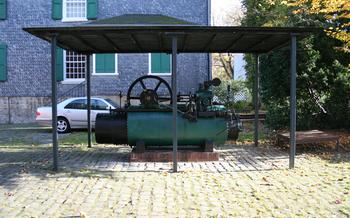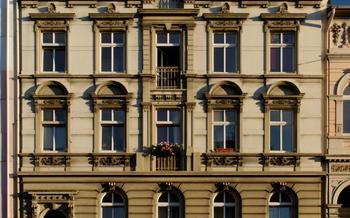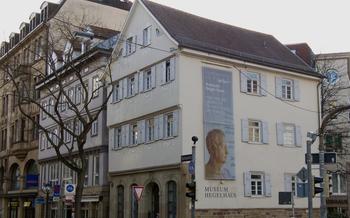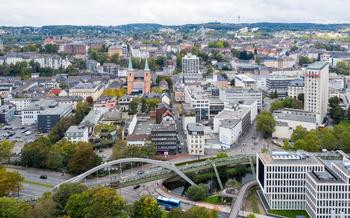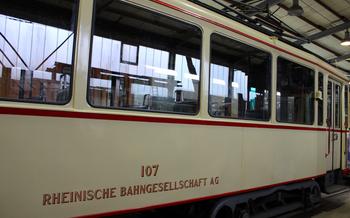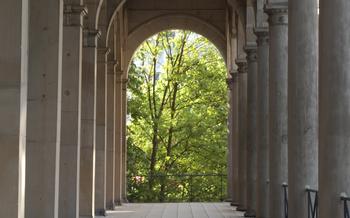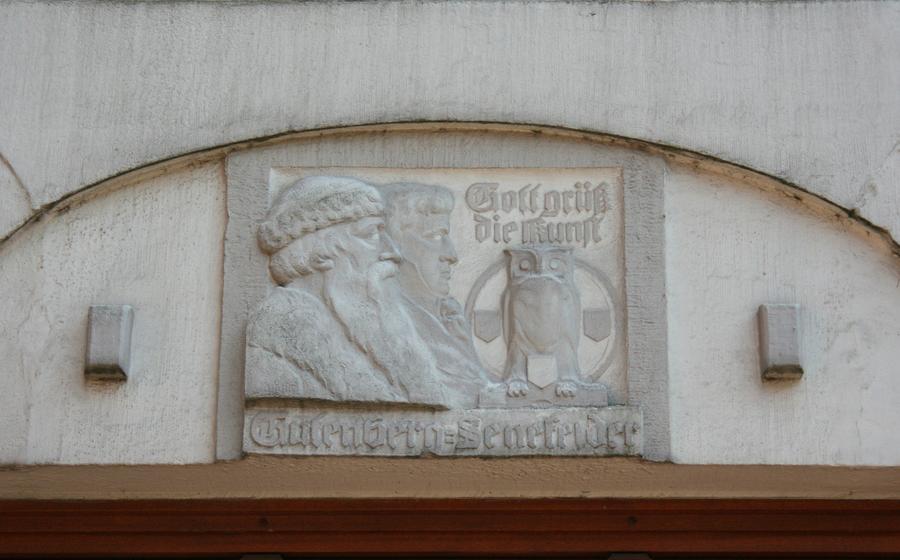
Friedrich Engels Memorial
- Friedrich Engels Memorial: A Historical Monument in Wuppertal
- Immersive Exhibits and Displays
- Guided Tours and Educational Programs
- The Spirit of Solidarity and Activism
- Unveiling the Man Behind the Theories
- Outdoor Exploration and Sculptures
- A Pilgrimage for Social Thinkers
- Temporary Exhibitions and Events
- Capturing the Essence through Photography
- Accessibility and Visitor Information
- The Engels Museum in Wuppertal: A Complementary Visit
- Integrating the Memorial into Wuppertal's Culture
- The Wuppertal Institute: A Center for Research and Innovation
- Insider Tip: A Walk Along the Engels Trail
Friedrich Engels Memorial: A Historical Monument in Wuppertal
The Friedrich Engels Memorial in Wuppertal, Germany, stands as a tribute to the life and legacy of one of the most influential figures in the history of social thought and activism. Engels, a close collaborator of Karl Marx, played a pivotal role in the development of Marxist theory and the workers' movement. The memorial, situated in the heart of Wuppertal's historic district, serves as a poignant reminder of Engels' contributions to social justice and workers' rights.
The memorial's historical significance lies in its commemoration of Engels' life and his profound impact on social and economic thought. Through his writings and activism, Engels challenged conventional notions of capitalism and class struggle, advocating for the rights of the working class and laying the foundation for modern socialism.
The architectural design of the memorial, completed in 1986, is a testament to Engels' enduring legacy. The bronze statue depicts Engels in a contemplative pose, while the surrounding park and sculpture garden provide a serene space for visitors to reflect on his ideas and contributions.
Wuppertal, the backdrop of the memorial, holds a rich cultural and historical context. The city, once a prominent industrial hub, played a significant role in the development of the German labor movement. Engels' birthplace, situated in the heart of Wuppertal, further underscores the city's deep connection to his life and work.
Immersive Exhibits and Displays
The Friedrich Engels Memorial not only serves as a historical landmark but also offers visitors a unique and engaging educational experience through its immersive exhibits and displays. Interactive displays showcase Engels' work and ideas, allowing visitors to explore his theories and writings in a hands-on and engaging way. Thematic displays delve into Engels' contributions to social theory and activism, highlighting his groundbreaking insights into class struggle, capitalism, and the working class.
Personal artifacts and memorabilia from Engels' life offer a glimpse into the personal side of the renowned thinker. Visitors can see his desk, manuscripts, and personal belongings, gaining a deeper understanding of his daily life and the context in which he developed his theories. Multimedia presentations and audiovisual experiences bring Engels' ideas to life, using sound, images, and animation to create a truly immersive and memorable learning experience.
Guided Tours and Educational Programs
The Friedrich Engels Memorial offers a range of guided tours and educational programs designed to provide visitors with a deeper understanding of Engels' life, work, and legacy. Specialized guided tours are available for groups and individuals, allowing visitors to explore the memorial at their own pace and delve into specific aspects of Engels' life and theories.
Educational programs and workshops are also organized for students, providing them with an opportunity to learn about Engels' contributions to social theory and activism. These programs often include interactive sessions, group discussions, and hands-on activities, making learning about Engels' ideas engaging and enjoyable.
Lectures, seminars, and discussions on Engels' theories are regularly held at the memorial, inviting renowned scholars and experts to share their insights and engage in thought-provoking debates.
For academics and scholars, the memorial offers research opportunities, providing access to its archives and resources, and facilitating collaborations with researchers from around the world.
The Spirit of Solidarity and Activism
The Friedrich Engels Memorial stands as a testament to the enduring spirit of solidarity and activism that shaped Engels' life and work. His unwavering commitment to the working class and his dedication to social justice continue to resonate with visitors from all walks of life. The memorial serves as a reminder of the struggles and triumphs of the labor movement, highlighting the importance of collective action and the pursuit of a more just and equitable society.
Engels' legacy extends beyond his theoretical contributions, embodying the essence of activism and social change. The memorial honors his tireless efforts to improve the lives of working people, and it inspires visitors to reflect on their own role in promoting social justice. Whether through guided tours, educational programs, or simply a moment of contemplation, the memorial provides a platform for contemporary discussions on social issues, encouraging visitors to engage in meaningful dialogue and action.
Unveiling the Man Behind the Theories
Beyond his intellectual contributions, Friedrich Engels was a multifaceted individual with a rich personal life and meaningful relationships. His close friendship with Karl Marx, a fellow philosopher and revolutionary, is well-known. Together, they formed a formidable partnership that transformed social and political thought. However, Engels' interactions extended beyond Marx. He maintained correspondences and collaborated with numerous intellectuals, activists, and friends across Europe.
Engels' personal life was marked by his deep connections with his family and his commitment to his work. He was known for his generosity and his willingness to support those in need. His relationships with his sisters and his niece reflected his compassion and his dedication to his family.
Unveiling the human side of Engels provides a more comprehensive understanding of the man behind the theories. His personal anecdotes and reflections, as well as accounts from his contemporaries, reveal a complex and passionate individual who dedicated his life to fighting for social justice and improving the lives of the working class. By exploring this aspect of Engels' life, visitors to the memorial gain a deeper appreciation for his contributions and the enduring impact of his work.
Outdoor Exploration and Sculptures
The Friedrich Engels Memorial not only offers a wealth of historical and theoretical insights but also provides visitors with a serene and contemplative outdoor space. The memorial's grounds are beautifully landscaped, featuring tranquil gardens, meandering walkways, and shaded seating areas, inviting visitors to relax and reflect on Engels' life and legacy.
Among the highlights of the outdoor space are several sculptures and artworks inspired by Engels' life and work. These sculptures, created by renowned artists, offer a unique visual interpretation of Engels' ideas and contributions. Visitors can admire the symbolic representations of Engels' commitment to social justice and his enduring influence on social movements throughout history.
The surrounding park further enhances the memorial's serene atmosphere, providing a natural backdrop for contemplation and exploration. Visitors can stroll through the park's lush greenery, enjoying the fresh air and the beauty of nature while reflecting on the profound impact of Engels' ideas on society.
A Pilgrimage for Social Thinkers
The Friedrich Engels Memorial in Wuppertal stands as a beacon of inspiration for social thinkers and activists from around the world. Engels' groundbreaking ideas on social justice, workers' rights, and class struggle continue to resonate in contemporary social discourse, making the memorial a significant destination for those seeking to delve deeper into his legacy.
Engels' writings have had a profound impact on the development of modern political movements, including socialism, communism, and social democracy. His insights into the nature of capitalism and the exploitation of workers have shaped the thinking of generations of activists and policymakers. As a result, the memorial attracts scholars, researchers, and social activists eager to explore the roots of modern social thought.
Visiting the memorial is an opportunity to connect with the intellectual legacy of one of history's most influential thinkers. It is a place to reflect on the ongoing struggle for social justice and to draw inspiration from Engels' unwavering commitment to workers' rights. The memorial serves as a reminder that social change is possible and that the fight for a more just and equitable society continues to be a vital and urgent pursuit.
Temporary Exhibitions and Events
The Friedrich Engels Memorial is not merely a static monument but also a dynamic platform for exploring various aspects of Engels' life and work through temporary exhibitions and events. These exhibitions delve into specific themes, offering visitors a fresh perspective on Engels' ideas and their contemporary relevance. Workshops, conferences, and special events are regularly organized, inviting scholars, activists, and the general public to engage with Engels' legacy in a thought-provoking and interactive manner. Collaborations with cultural institutions and universities ensure a diverse range of exhibitions and events, making the memorial a vibrant hub for learning and engagement.
Capturing the Essence through Photography
The Friedrich Engels Memorial offers a wealth of photo opportunities for visitors to capture the essence of this historical site. The striking architecture of the memorial, with its bold lines and geometric shapes, provides a visually appealing backdrop for photographs. The surrounding park, with its lush greenery and tranquil atmosphere, offers a serene setting for capturing the memorial in its natural context. Visitors can also photograph the various sculptures and artworks inspired by Engels' life, which are scattered throughout the grounds. These works of art provide a unique perspective on Engels' legacy and his impact on the world. Whether capturing the memorial's architectural grandeur, the beauty of its surroundings, or the artistic interpretations of Engels' life, visitors will find ample opportunities to create memorable images that will serve as lasting reminders of their visit to this important site.
Accessibility and Visitor Information
The Friedrich Engels Memorial is committed to providing an inclusive and welcoming experience for all visitors. To ensure accessibility for visitors with disabilities, the memorial offers a range of features, including wheelchair ramps, elevators, and accessible restrooms.
For a comprehensive and enriching experience, visitors can take advantage of the informative brochures, maps, and audio guides available in multiple languages. Multilingual guides are also on hand to provide assistance and answer questions, ensuring that all visitors can fully appreciate the significance of the memorial. To cater to group visits and school excursions, the memorial offers tailored guided tours and educational programs, allowing groups to explore the memorial's exhibits and learn about Engels' life and contributions in a structured and interactive manner.
The Engels Museum in Wuppertal: A Complementary Visit
For a more comprehensive exploration of Friedrich Engels' life and work, a visit to the Engels Museum in Wuppertal is highly recommended. Located near the memorial, the museum houses an extensive collection of artifacts, documents, and manuscripts that provide a deeper insight into his intellectual journey. Visitors can see personal belongings, letters, and manuscripts that shed light on Engels' personal life and relationships, as well as his collaborations with other thinkers of his time. The museum also offers thematic exhibitions and educational programs that delve into the various aspects of Engels' contributions to social theory and activism. A visit to the Engels Museum complements the experience at the memorial by providing a more comprehensive understanding of Engels' intellectual legacy and its relevance to contemporary social issues.
Integrating the Memorial into Wuppertal's Culture
The Friedrich Engels Memorial in Wuppertal stands as a testament to the city's rich history and cultural identity. The memorial, dedicated to the life and work of the renowned philosopher and revolutionary, serves as a symbol of social justice and activism, deeply intertwined with the fabric of Wuppertal's cultural heritage. The city embraces the legacy of Engels, fostering a sense of pride and appreciation for his contributions to social theory and workers' rights.
Collaborations with local organizations and initiatives play a vital role in integrating the memorial into Wuppertal's cultural landscape. The memorial collaborates with museums, theaters, and educational institutions to organize events, workshops, and exhibitions that explore Engels' life and ideas from diverse perspectives. These collaborations create a dynamic platform for cultural exchange and dialogue, allowing the memorial to engage with a broader audience and foster a deeper understanding of Engels' significance.
Promoting awareness and appreciation of Engels' legacy is a crucial aspect of the memorial's integration into Wuppertal's culture. Through guided tours, educational programs, and public events, the memorial actively engages with the community, fostering a sense of connection to Engels' work and its relevance to contemporary social issues. By highlighting Engels' contributions to social justice, the memorial inspires and empowers individuals to become agents of change in their own communities.
The Friedrich Engels Memorial is not just a historical site but a vibrant hub for cultural exchange and dialogue. It serves as a reminder of the power of ideas and the importance of social activism, inviting visitors to explore the legacy of Engels and engage with the ongoing struggle for social justice. By embracing Engels' legacy, Wuppertal celebrates its rich history while simultaneously positioning itself as a city that values intellectual discourse, cultural diversity, and social progress.
The Wuppertal Institute: A Center for Research and Innovation
The Friedrich Engels Memorial is closely linked to the Wuppertal Institute for Climate, Environment, and Energy, a renowned research institute dedicated to addressing contemporary social, economic, and environmental challenges. The institute, established in 1991, carries forward Engels' legacy of critical thinking and social engagement. Its research focuses on sustainable development, energy transition, and climate protection, areas where Engels' ideas on social justice and the environment remain highly relevant.
The Wuppertal Institute serves as a platform for groundbreaking research, policy development, and collaboration among scientists, policymakers, and civil society organizations. It fosters interdisciplinary research and promotes innovative solutions to pressing global issues. Through its work, the institute contributes to shaping a more sustainable and just society, echoing Engels' commitment to social transformation.
The proximity of the Friedrich Engels Memorial to the Wuppertal Institute creates a unique synergy between historical reflection and contemporary action. Visitors to the memorial can gain insights into Engels' ideas and their enduring significance, while the institute provides a glimpse into the practical application of these ideas in addressing today's challenges.
Collaboration opportunities exist for researchers and organizations interested in exploring the nexus between Engels' theories and contemporary sustainability issues. The institute welcomes partnerships that advance social justice, promote sustainable development, and contribute to a better understanding of the complex challenges facing our society.
Insider Tip: A Walk Along the Engels Trail
For an immersive experience, embark on a leisurely walk along the Engels Trail, a scenic route that connects the Friedrich Engels Memorial to other significant sites related to his life and work. This self-guided tour offers a unique opportunity to explore the industrial heritage of Wuppertal while following in the footsteps of Engels himself.
As you stroll along the trail, you'll encounter numerous landmarks that played a pivotal role in Engels' life. Visit the house where he was born, now a museum dedicated to his early years and family history. Explore the historic Engels House, where he lived and worked for many years, and immerse yourself in the environment that shaped his intellectual journey.
The trail also takes you past significant industrial sites that were central to Engels' understanding of the working class and the capitalist system. Visit the former textile factory where his father worked, and learn about the harsh conditions faced by factory workers during the Industrial Revolution.
Along the way, you'll also encounter sculptures and artworks inspired by Engels' life and work. These artistic expressions provide a deeper insight into his ideas and their impact on society. Take a moment to reflect on the enduring legacy of this influential thinker as you admire these creative tributes.
The Engels Trail is not just a historical journey; it's an opportunity to experience the vibrant city of Wuppertal through the eyes of one of its most famous sons. As you walk in Engels' footsteps, you'll gain a deeper appreciation for his contributions to social theory and activism, and the lasting impact of his ideas on the world we live in today.
